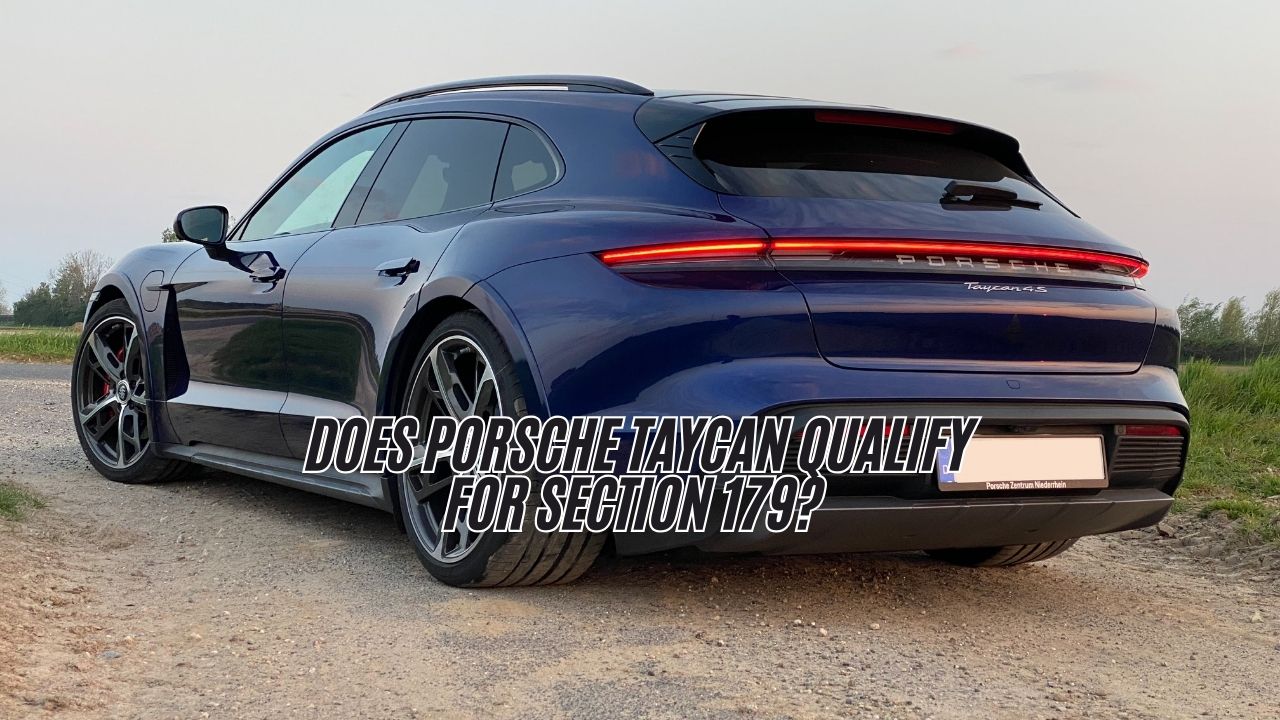Does Porsche Taycan Qualify For Section 179? The Porsche Taycan does not typically qualify for Section 179 due to weight and classification restrictions.
In recent years, Section 179 has emerged as a valuable tax deduction tool for businesses looking to minimize their taxable income by purchasing qualifying vehicles and equipment.
As the automotive industry continues its shift toward electrification, electric vehicles (EVs) have caught the attention of businesses aiming to reduce their carbon footprint.
The Porsche Taycan, a luxury electric sports sedan, stands out as one of the most popular EVs on the market. But does the Porsche Taycan qualify for Section 179?
This blog post will take an in-depth look at Section 179, the Porsche Taycan, and whether businesses can benefit from purchasing this vehicle.
What Is Section 179?
Section 179 of the U.S. Internal Revenue Code allows businesses to deduct the cost of certain assets, including vehicles and equipment, from their gross income in the same tax year the purchase is made, rather than depreciating the asset over several years.
This provision is particularly beneficial for businesses looking to invest in new equipment, technology, and vehicles without waiting years to realize tax benefits.
The key benefit of Section 179 is that it incentivizes businesses to invest in assets that help them grow and improve their operations. [Does Porsche Taycan Qualify For Section 179?]
By accelerating tax deductions, Section 179 can help businesses reduce their taxable income for the year and reinvest the tax savings into their business.
Vehicle Eligibility Requirements
Vehicles must meet several criteria to qualify for a Section 179 deduction:
- Weight Requirement: Vehicles must have a gross vehicle weight rating (GVWR) of at least 6,000 pounds but no more than 14,000 pounds to qualify for the full deduction.
- Business Use: The vehicle must be used for business purposes at least 50% of the time. [Does Porsche Taycan Qualify For Section 179?]
- Vehicle Type: Typically, Section 179 is geared toward heavy-duty vehicles, such as SUVs, trucks, and vans, although some passenger vehicles may qualify for partial deductions.
For businesses, Section 179 offers an appealing tax-saving opportunity, particularly for those needing heavy-duty vehicles to conduct daily operations. But does this tax benefit extend to electric vehicles like the Porsche Taycan?
The Porsche Taycan: A Luxury Electric Vehicle
The Porsche Taycan is a high-performance electric sports sedan, known for its cutting-edge technology, stunning design, and high speed. [Does Porsche Taycan Qualify For Section 179?]
As Porsche’s flagship electric vehicle, the Taycan has attracted widespread attention for its ability to offer both sustainability and a thrilling driving experience.
This luxury EV is well-regarded among those seeking a top-tier driving experience without sacrificing environmental responsibility.
Features and Specifications
The Porsche Taycan stands out as a powerful, well-engineered electric vehicle:
- Design: The Taycan boasts a sleek, aerodynamic body with a futuristic and luxurious interior that combines high-end materials with advanced technology. [Does Porsche Taycan Qualify For Section 179?]
- Performance: Powered by electric motors, the Taycan offers blistering acceleration, with some models capable of reaching 0 to 60 mph in less than 3 seconds. It also provides an impressive driving range, making it suitable for both daily commuting and long road trips.
- Electric Appeal: As an electric vehicle, the Taycan produces zero tailpipe emissions, helping reduce a driver’s carbon footprint. For businesses, this can be an attractive feature as companies increasingly prioritize sustainability and corporate responsibility.
While the Taycan is an impressive vehicle, the big question remains: does it qualify for the Section 179 deduction?
Does Porsche Taycan Qualify For Section 179?
After reviewing the criteria set forth under Section 179, it becomes clear that the Porsche Taycan does not qualify for this specific tax deduction. Several factors contribute to this outcome, which we will examine in detail below.
Weight and Vehicle Classification
One of the primary reasons the Porsche Taycan does not qualify for Section 179 is its weight. To qualify for the full Section 179 deduction, a vehicle must have a gross vehicle weight rating (GVWR) of at least 6,000 pounds.
The Porsche Taycan falls well below this weight threshold, as it is classified as a light passenger vehicle rather than a heavy-duty SUV or truck. [Does Porsche Taycan Qualify For Section 179?]
While some heavier vehicles, such as large SUVs and trucks, meet the weight requirement for Section 179, electric sedans like the Taycan generally do not qualify due to their lighter construction.
Business Use Consideration
To qualify for a Section 179 deduction, the vehicle must be used for business purposes at least 50% of the time. [Does Porsche Taycan Qualify For Section 179?]
While it is possible for the Taycan to be used for business purposes, its classification as a light passenger vehicle further disqualifies it from the full deduction.
Section 179 is typically designed to benefit businesses that require heavy-duty vehicles, such as construction trucks, vans, and large SUVs.
If the Taycan is used for business purposes, there may be other ways to write off the purchase over time, but it will not qualify for the accelerated deduction that Section 179 offers for heavier vehicles.
Electric Vehicle Incentives vs. Section 179
Although the Porsche Taycan does not meet the criteria for Section 179, businesses and individuals purchasing electric vehicles can still benefit from other tax incentives.
These incentives are designed to promote the adoption of electric vehicles, which play a critical role in reducing greenhouse gas emissions. [Does Porsche Taycan Qualify For Section 179?]
- Federal EV Tax Credit: The U.S. government offers a federal tax credit of up to $7,500 for the purchase of a qualifying electric vehicle. However, this tax credit may be subject to phaseouts, depending on the manufacturer and the vehicle model.
- State and Local Incentives: Many states and municipalities offer additional incentives, such as rebates, tax credits, and reduced registration fees for electric vehicle purchases. These incentives can vary significantly by location, so it’s essential to check with your local government to understand the available benefits.
For business owners who prioritize sustainability, these electric vehicle incentives can still provide significant savings, even if the Taycan does not qualify for Section 179.
Potential Exceptions and Loopholes
At this time, there are no significant exceptions or loopholes that would allow the Porsche Taycan to qualify for Section 179. [Does Porsche Taycan Qualify For Section 179?]
The tax code is strict about the weight and classification requirements for vehicles to receive the full deduction, and electric sedans like the Taycan fall outside the scope of these provisions.
However, businesses investing in electric vehicle infrastructure, such as charging stations, may be eligible for other tax benefits or deductions designed to promote the adoption of sustainable technologies.
Eligible Alternatives: Other Vehicles That Qualify For Section 179
If you’re a business owner looking for a vehicle that qualifies for Section 179, there are other options to consider, particularly in the realm of SUVs, trucks, and vans.
Several Porsche models and other vehicles meet the weight and business-use requirements, making them eligible for the full deduction. [Does Porsche Taycan Qualify For Section 179?]
- Porsche Cayenne: The Porsche Cayenne is a luxury SUV that may qualify for the Section 179 deduction, depending on the specific model’s weight and how it is used for business. Its larger size and more rugged capabilities compared to the Taycan make it a more viable option for businesses seeking tax savings through Section 179.
- Other Qualifying SUVs and Trucks: Vehicles like the Chevrolet Suburban, Ford Expedition, and GMC Yukon are popular choices for businesses looking to take advantage of the Section 179 deduction. These vehicles are typically used for commercial purposes and meet the weight requirements necessary to qualify.
When selecting a vehicle for your business, it’s essential to verify that the specific model meets the weight and business-use criteria outlined in Section 179.
This ensures that you can take full advantage of the tax deduction and maximize your savings. [Does Porsche Taycan Qualify For Section 179?]
Final Verdict: Taycan and Section 179
In conclusion, the Porsche Taycan does not qualify for the Section 179 tax deduction due to its weight and classification as a light passenger vehicle.
While the Taycan is an outstanding luxury electric vehicle, it falls outside the scope of the Section 179 deduction, which is primarily geared toward heavy-duty vehicles like trucks, vans, and SUVs.
However, business owners and individuals who purchase the Taycan can still benefit from other tax incentives aimed at promoting electric vehicle adoption.
These incentives, such as the federal EV tax credit and state-level rebates, can provide significant savings and make the Taycan a worthwhile investment for those prioritizing sustainability and performance.
If you’re a business owner focused on taking advantage of Section 179, consider looking into alternative vehicle options that meet the deduction’s weight and business-use requirements.
SUVs like the Porsche Cayenne or other heavy-duty vehicles may be a better fit for maximizing your tax savings. [Does Porsche Taycan Qualify For Section 179?]
See Also: Who Owns The Porsche White Collection?
FAQs
Does the Porsche Taycan qualify for any other tax benefits?
Yes, the Porsche Taycan may qualify for federal and state electric vehicle tax incentives, including the federal EV tax credit, which can reduce the overall cost of the vehicle.
What are the weight requirements for Section 179 vehicle deductions?
Vehicles must have a gross vehicle weight rating (GVWR) of at least 6,000 pounds to qualify for Section 179. The Porsche Taycan falls below this threshold.
Are there electric vehicles that qualify for Section 179?
Most electric vehicles do not meet the weight requirement for Section 179, but heavy-duty electric trucks or larger SUVs could potentially qualify.
Can I still use the Taycan for business purposes and receive tax deductions?
While the Taycan doesn’t qualify for Section 179, you may be able to depreciate its value over time or take advantage of electric vehicle tax credits.
What other incentives does Porsche offer for business owners?
Porsche offers financing options, fleet programs, and occasionally special deals for businesses. It’s worth consulting with a local Porsche dealer for the most up-to-date offers.
Conclusion: Does Porsche Taycan Qualify For Section 179?
While the Porsche Taycan doesn’t qualify for Section 179, it remains a compelling choice for businesses and individuals seeking a luxury electric vehicle that aligns with sustainability goals.
Even without Section 179 eligibility, the Taycan still offers a range of other tax benefits, including federal and state EV incentives that can offset its cost.
Business owners interested in maximizing tax savings under Section 179 should explore other vehicle options, such as SUVs and trucks, that meet the necessary criteria.
However, for those more concerned with reducing their environmental impact, the Taycan stands out as a high-performance, eco-friendly option that doesn’t compromise on luxury.

Hello, I am Jude Huff from South Carolina, USA. I have loved Porsche cars since I was a child, thanks to my father who owned one. With years of experience driving and learning about these cars, I started this blog to share my knowledge and passion with other Porsche fans.

